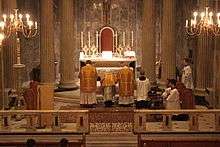Penitential Rite

In Roman Catholicism and Lutheranism, the Penitential Rite, also known as confession that takes place at the start of each Divine Service or Mass.
Usage in Roman Catholicism
In the ordinary form of the Roman Rite Mass
In the Roman Catholic Church, the ordinary form of the Mass was promulgated in 2000 as Third edition of the Roman Missal. In the ordinary form, the Penitential Act is part of the Introductory Rites. It follows the greeting in the order of Mass.[1] The three formulas of the Penitential Act are:
- Formula B - a short dialogue between the priest and congregation.
- Formula C - a dialogue said or sung by the deacon or priest, or sung by the cantor. It contains three tropes, each followed by and acclamation (Kyrie or Christe Eleison)
The formula of absolution which concludes all three formulas.
Formula C, which allows freedom for the celebrant to formulate similar acclamations with a more eucharistic tone, is recommended by many prominent liturgist.[2] They ask “why run the risk of individualizing members of the assembly in a penitential mode after they have gathered precisely as a worshipping community?”[3]
The Penitential Act is followed by the Kyrie eleison chant (unless the third of the three formulas, which incorporates the Kyrie, has been chosen as the Penitential Act), the Gloria (if used), and the Collect, which concludes the Introductory Rites.[4]
If certain celebrations are combined with Mass, then the Penitential Act and other parts of the Introductory Rites are omitted or performed in a different way.[5] An example is the Mass of Ash Wednesday, in which the Penitential Act is replaced by the blessing and imposition of ashes after the homily.
"On Sundays, especially in the Season of Easter, in place of the customary Penitential Act, from time to time the Blessing and Sprinkling of Water to recall Baptism may take place."[6]
Pre-1970 Roman Missal
In the Tridentine Mass the Confiteor prayer is part of the Prayers at the Foot of the Altar. The formula in Liturgical Latin is:
- ℣ (Priest): "Confíteor Deo omnipoténti, beátæ Maríæ semper Vírgini, beáto Michaéli Archángelo, beáto Ioánni Baptístæ, sanctis Apóstolis Petro et Páulo, ómnibus Sanctis, et vobis, fratres: quia peccávi nimis cogitatióne, verbo, et ópere: mea culpa, mea culpa, mea máxima culpa. Ideo precor beátam Maríam semper Virginem, beátum Michaélem Archángelum, beátum Ioánnem Baptístam, sanctos Apóstolos Petrum et Páulum, omnes Sanctos, et vos, fratres, oráre pro me ad Dóminum Deum nostrum. "
℟ (Deacon and subdeacon at a solemn Mass, server(s) at a low Mass, or server(s) and people at a dialogue Mass): "Misereátur tui omnípotens Deus, et dimíssis peccátis tuis, perdúcat te ad vitam ætérnam. "
℣: "Amen "
The others then, on their part, recite the Confiteor, replacing vobis fratres with tibi pater and vos fratres with te pater. The Misereatur is spoken by the priest replacing tui with vestri, tuis with vestris, and te with vos.
The formula of absolution, known by its incipit Indulgentiam absolutionem, which concludes the rite is:
- ℣ (Priest): "Indulgéntiam, absolutiónem, et remissiónem peccatórum nostrórum, tríbuat nobis omnípotens et miséricors Dóminus. "
℟: "Amen "
Usage in Lutheranism
Beliefs
Sometimes known as "general confession", the Lutheran Penitential Rite[7] is done at the start of each Mass. The pastor and congregation say the Confiteor and the pastor says the Declaration of Grace. The Declaration of Grace is not an absolution. In Lutheran practice, the sacramental rite of confession is its own separate service, and private confession is expected before partaking of the Eucharist.[8]
Formula
Pastor: "If we say we have no sin, we deceive ourselves, and the truth is not in us."
People: "But if we confess our sins, God who is faithful and just will forgive our sins and cleanse us from all unrighteousness."
Pastor: "Let us then confess our sins to God our Father."
People: "Most merciful God, we confess that we are by nature sinful and unclean. We have sinned against you in thought, word, and deed, by what we have done and by what we have left undone. We have not loved You with our whole heart; we have not loved our neighbors as ourselves. We justly deserve Your present and eternal punishment. For the sake of Your Son, Jesus Christ, have mercy on us. Forgive us, renew us, and lead us, so that we may delight in Your will and walk in Your ways to the glory of your Holy Name. Amen."
Pastor: "In the mercy of almighty God, Jesus Christ was given to die for us, and for His sake God forgives us all our sins. To those who believe in Jesus Christ He gives the power to become the children of God and bestows on them the Holy Spirit. May the Lord, who has begun this good work in us, bring it to completion in the day of our Lord Jesus Christ.[9]"
References
- ↑ https://www.dropbox.com/s/en6h3a7awzq47dh/THE%20ROMAN%20MISSAL.pdf?dl=0
- ↑ Leon-Dufour, Xavier, Sharing the Eucharistic Bread, New Jersey: Paulist Press, 1987, ISBN 0809128659. Boyer, Louis, Eucharist, Indiana: Notre Dame Press, 1989, p.318, ISBN 0268004986. Von Balthasar, Hans Urs, Church and World, Herder and Herder, 1967, p.32, ASIN: B001UESR2I.
- ↑ Grigassy, Daniel, in Dictionary of Sacramental Worship, ed. Peter E. Fink. Collegeville MN: Liturgical Press, 1991, pp.944f.
- ↑ General Instruction of the Roman Missal, 52-54
- ↑ General Instruction of the Roman Missal, 46
- ↑ General Instruction of the Roman Missal, 51
- ↑ . Retrieved 2010-03-12.
- ↑ Apology of the Augsburg Confession, article 24, paragraph 1. Retrieved 2010-01-30.
- ↑ (Lutheran Service Book, Divine Service I)